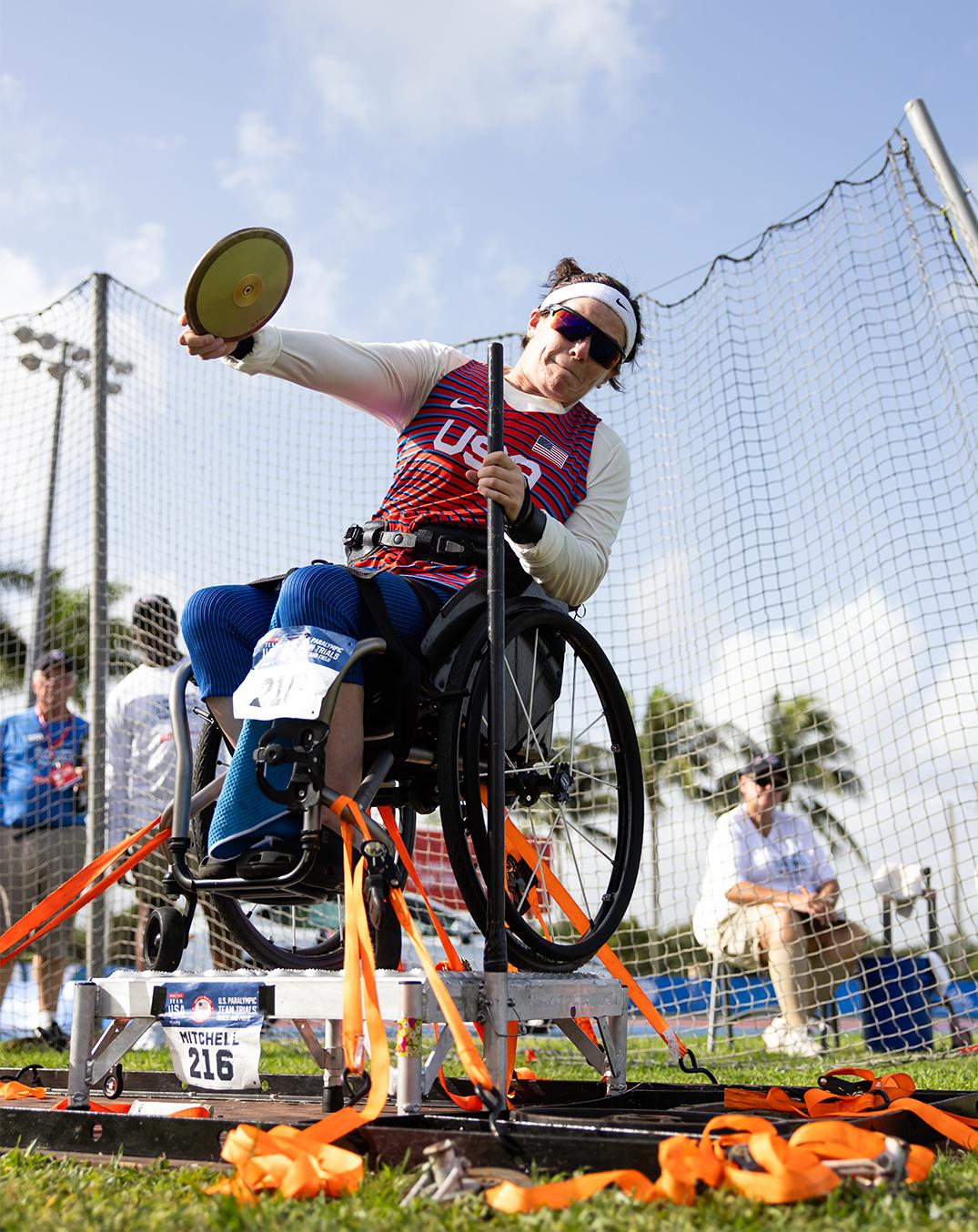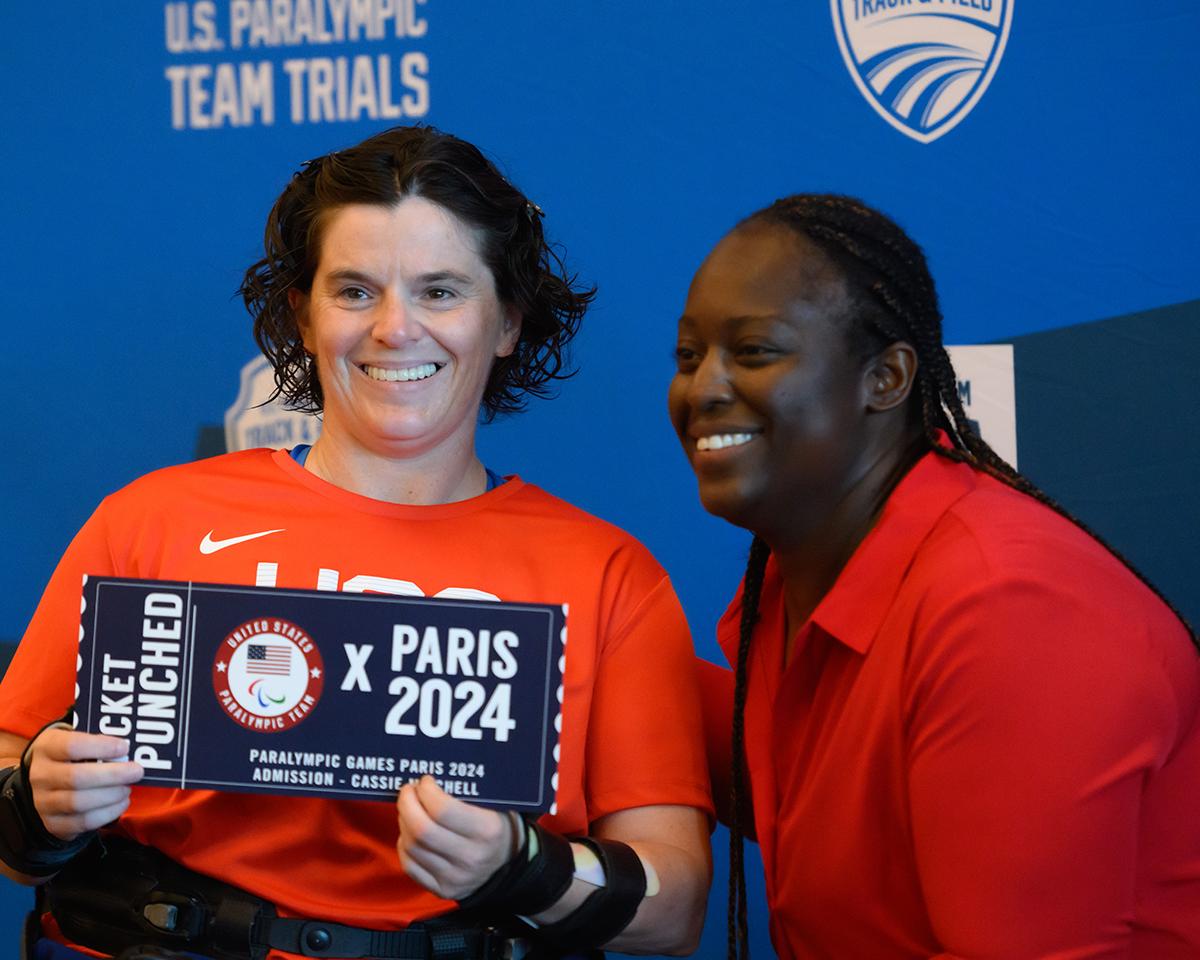Cassie Mitchell Pursues a 4th Paralympic Medal at Her 4th Straight Games
Sep 04, 2024 —

It’s tough to say what keeps pushing Cassie Mitchell to compete in the Paralympics.
Maybe it’s stubbornness, a refusal to let the degenerative neurological condition that has paralyzed much of her body control what she does.
Maybe it’s the fact that, despite three trips to the Paralympic Games going back to London in 2012 and despite medaling in 2016 and 2021, she still doesn’t have an elusive gold medal.
Maybe it’s simply that she’s been an athlete her entire life and thrives by pushing herself.
Whatever the motivation, Mitchell has qualified for her fourth straight Paralympic Games and will compete in the discus throw in Paris when the events get underway Aug. 28 – Sept. 8.
“My goal has been to be on the top of the podium, to see the flag come up, to hear the national anthem at a Paralympic Games. I have been blessed to get that at World Championships and some other events, but not at a Paralympic Games,” said Mitchell, an associate professor in the Wallace H. Coulter Department of Biomedical Engineering at Georgia Tech and Emory University. “That just keeps me coming back. It’s like this sign I keep on my shelf: ‘Never, never, never give up.’ As long as I am able to go out, be competitive, and have a chance, then I want to keep going.”
Discus has been one of Mitchell’s signature events for multiple Paralympic cycles. She won silver in 2016 and just missed the medal stand at the Covid-delayed 2021 Games.
Two of her nine American Paralympic track and field records are in discus, and she currently holds the world record for athletes with her level of physical disability.

Mitchell at the Paralympic Team Trials. (Photo: Joe Kusumoto, U.S. Olympic and Paralympic Committee)
Still, Mitchell said she’ll likely need to best her own record to have a chance at a medal.
That’s because the discus event will combine athletes with different levels of capability. Mitchell is classified as a 51 athlete, those with the most physical impairment. She will compete against women in the 52 and 53 classes, which have significantly more function in their limbs.
“When you start to mix classes, a paraplegic is going to throw farther than a quadriplegic. I can train to the ends of the Earth, and there’s only a certain amount I’m going to be able to overcome based upon the degree of paralysis in my upper body,” Mitchell said. “I’m doing my best to find what that limit is.”

Mitchell at the naming ceremony for the 2024 Paralympic Games after the track and field trials. (Photo: Joe Kusumoto, U.S. Olympic and Paralympic Committee)
In fact, she said she’s training harder now than she ever has. Partly, that’s a result of focusing her training on this discus rather than the club throw, an event where she has won Paralympic silver and bronze but that’s not on the event schedule for these Games.
Though she’s always competed in both events, she always felt she had a better shot at a medal with the club, so she focused on cardio and speed training. Now she’s dialing in on power and strength so she can compete with the athletes she’ll face in Paris.
“It’s going to take a world record to get on the medal stand, and even then, it may not happen. But that’s all I can control. If I can go and break my own world record as a 51, what more can you do?” Mitchell said. “I’ll know I left everything out there.”
Mitchell has been training in Atlanta and Oklahoma, where her coach is based. Throughout, Mitchell has continued to teach classes and conduct research focused on harnessing the power of big data and machine learning to forecast disease, identify new therapeutics, and optimize treatments.
Her engineering mindset is part of her athletic endeavors, too, helping her train smarter rather than just harder, she said: “I’ve always done a biomechanical breakdown in my throw. I also am coming in with a different throwing chair setup to try to get better balance. Discus is heavier, so I’m trying to get a little bit more balanced and see if that helps me go farther.”
Still, stubbornness sometimes wins out, which is when it’s nice to have her coach also happen to be her mom — the first time that’s officially been the case prior to a Paralympic Games.
“The nice thing about having my mom as coach is she can control that knob a little better than some people,” Mitchell said. “She probably lets me throw more than what most coaches would. She’s also still mom. She will still put her foot down and say, ‘Enough.’”
At 43, Mitchell doesn’t think she’s hit her ceiling yet. She’s really drawn to the idea of competing on home turf at the 2028 Games in Los Angeles. She’s picked up another sport called boccia to increase her chances of making those Games. It’s somewhat similar to bocce, where players have to throw balls as close to a target ball as possible. She has teamed with former wheelchair tennis player Nick Taylor, and they’ve already medaled in an international competition.
“I’m a very patriotic person,” she said. “It doesn’t say Mitchell on my uniform, it says USA. And I think to compete on home soil would be really special.”
Joshua Stewart




